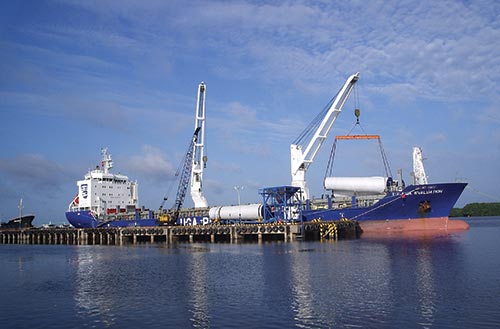
| Cai Mep-Thi Vai authority proposed | |
The Ba Ria-Vung Tau Provincial People’s Committee has proposed the Vietnamese government to establish a port authority to administer the Cai Mep-Thi Vai port complex in a bid to optimise its investment efficiency. The proposal complies with a recent prime ministerial decision approving a transport sector restructuring plan that will serve industrialisation and modernisation for sustainable development through 2020 in the province. In the plan, the Cai Mep-Thi Vai port complex is specified as a top investment priority area to be developed into a modern port venue. Under the Ba Ria-Vung Tau Provincial People’s Committee proposal, the port authority will be a state management agency directly run by the provincial people’s committee which oversees the investment and operational activities of area seaports, as well as associated logistic centres. Other functions such as land fund management, infrastructure investment for leasing services, and supply of maritime services at port venues and logistic centres will be assumed by a specific business under the direct management of the port authority. If the proposal is green-lighted, the port authority of Ba Ria-Vung Tau will develop in two phases. First, in a five-year plan beginning in 2015, the Cai Mep-Thi Vai port complex management unit will be created to act as a state management agency under the provincial people’s committee direction. In the second phase, which starts in 2020, the port authority will be created through organisational change from the Cai Mep-Thi Vai port complex management unit. According to Deputy Chairman of the Ba Ria-Vung Tau Provincial People’s Committee Ho Van Nien, through field surveys conducted throughout Asia and Europe, port authorities have proven to be quite effective models in respect to business management. They have brought multiple benefits to business communities, particularly with the application of a one-stop-shop mechanism for conducting administrative procedures. “Applying the port authority model is a smart move, matching the world development trend,” Nien said. Earlier this year, the Vietnamese government allowed the Vietnam Maritime Administration to pilot the model at some ports. Ba Ria-Vung Tau has lodged its proposal and is awaiting the government’s final decision before proceeding at its Cai Mep-Thi Vai port complex. In fact, Cai Mep-Thi Vai has become an international transshipment port venue in the last five years. Many problems, however, persist with local port system management, including the lack of consistency among diverse state management agencies. The put-through cargo volumes at the Cai Mep-Thi Vai port complex remain rather low, at 550,000 TEUs in 2011, increasing to 950,000 TEUs in 2012 and 2013. In the first four months of this year, the port group only received 348,000 TEUs, meaning about 15 per cent of port capacity was tapped, causing great waste. As the cargo volume is far below port capacity, there has been fierce competition among ports in this area to attract customers. Some ports have cut fee levels - an imprudent move that has lowered port investment efficiency. Current procedures still prove cumbersome, causing inconveniences to ship consigners. Ba Ria-Vung Tau is currently home to 52 port projects worth VND134.2 trillion ($7.06 billion) in the total committed investment capital. In the first nine months of 2014, the disbursed sum of the province’s seaport projects mounted to VND1.516 trillion ($72 million), bringing the total realised capital of seaport projects in the province to VND42.1 trillion ($200 million) by September 2014, according to the Ba Ria-Vung Tau Provincial Department of Transport. | |
| VIR |
